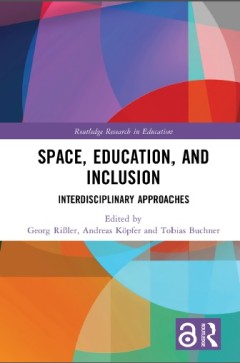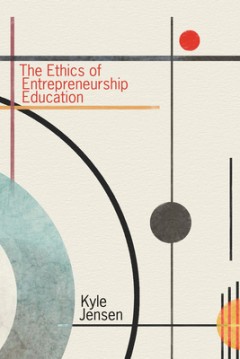Filter by
# Debug Box
/var/www/htdocs/pustaka-digital/lib/SearchEngine/SearchBiblioEngine.php:688 "Search Engine Debug 🔎 🪲"
Engine Type ⚙️: "SLiMS\SearchEngine\SearchBiblioEngine"
SQL ⚙️: array:2 [ "count" => "select count(sb.biblio_id) from search_biblio as sb where sb.opac_hide=0 and ((match (sb.topic) against (:subject in boolean mode)))" "query" => "select sb.biblio_id, sb.title, sb.author, sb.topic, sb.image, sb.isbn_issn, sb.publisher, sb.publish_place, sb.publish_year, sb.labels, sb.input_date, sb.edition, sb.collation, sb.series_title, sb.call_number from search_biblio as sb where sb.opac_hide=0 and ((match (sb.topic) against (:subject in boolean mode))) order by sb.last_update desc limit 10 offset 0" ]
Bind Value ⚒️: array:1 [ ":subject" => "'+\"Education\"'" ]

Space, education, and inclusion
This timely, edited volume brings together interdisciplinary perspectives on space and spatiality in inclusive education discourses. With research from an international range of scholars, the book explores the intersections, boundaries, and intermediary spaces of inclusion and exclusion within educational contexts. It advances thinking in inclusive education research and links discourses of …
- Edition
- Ed. 1
- ISBN/ISSN
- 9781003313014
- Collation
- -
- Series Title
- -
- Call Number
- 371.9 RIB r

Shadow libraries: access to knowledge in global higher education
From the top down, Shadow Libraries explores the institutions that shape the provision of educational materials, from the formal sector of universities and publishers to the broadly informal ones organized by faculty, copy shops, student unions, and students themselves. It looks at the history of policy battles over access to education in the post–World War II era and at the narrower versions…
- Edition
- -
- ISBN/ISSN
- 9780262345699
- Collation
- 313 p. : ill.
- Series Title
- -
- Call Number
- 070.5 KAR s

Education and learning for sustainable futures: 50 Years of Learning for Envi…
Responding to growing interest in the sustainable development goals (SDGs) and global concern over climate change, this volume provides an analysis of how our understanding of the relationship between environment and education has evolved during the past 50 years. Spanning from the 1972 United Nations Conference on the Human Environment through to the present day, chapters examine whether our a…
- Edition
- -
- ISBN/ISSN
- 9781003467007
- Collation
- xvi, 118 p. : ill.
- Series Title
- -
- Call Number
- 304.2071 MAC e
Paradoxes of interculturality: a toolbox of out-of-the-box ideas for intercul…
Offering a unique reading experience, this book examines the epistemologies of interculturality and explores potential routes to review and revisit the notion anew. Grounded in different sociocultural, economic and political perspectives around the world, interculturality in education and research bears a paradoxical attribute of 'contradictions' and 'inconsistencies', making it a polysemous a…
- Edition
- -
- ISBN/ISSN
- 9781003371052
- Collation
- vi, 139 p.
- Series Title
- -
- Call Number
- 370.117 FRE p
The left hand of data: designing education data for justice
A speculative framework that imagines how we can use education data to promote play, creativity, and social justice over normativity and conformity. Educational analytics tend toward aggregation, asking what a “normative” learner does. In The Left Hand of Data, educational researchers Matthew Berland and Antero Garcia start from a different assumption—that outliers are, and must be tre…
- Edition
- -
- ISBN/ISSN
- 9780262377645
- Collation
- 204 p. : ill.
- Series Title
- -
- Call Number
- 370.285 BER l
Constructing science: connecting causal reasoning to scientific thinking in y…
Young children have remarkable capacities for causal reasoning, which are part of the foundation of their scientific thinking abilities. In Constructing Science, Deena Weisberg and David Sobel trace the ways that young children's sophisticated causal reasoning abilities combine with other cognitive, metacognitive, and social factors to develop into a more mature set of scientific thinking abili…
- Edition
- -
- ISBN/ISSN
- 9780262370615
- Collation
- xi, 374 p. : ill
- Series Title
- -
- Call Number
- 501 WEI c

Voices on the margins: inclusive education at the intersection of language, l…
A rich view of inclusive education at the intersection of language, literacy, and technology—drawing on case study research in a diverse full-inclusion US school before, during, and after the COVID-19 pandemic. Despite advancing efforts at integration, the segregation of students with disabilities from their nondisabled peers persists. In the United States, 34 percent of all students with …
- Edition
- -
- ISBN/ISSN
- 9780262378581
- Collation
- l, 303 p. : ill.
- Series Title
- -
- Call Number
- 371.90460973 PRA v

Undeclared: a philosophy of formative higher education
An imaginative tour of the contemporary university as it could be: a place to discover self-knowledge, meaning, and purpose. What if college were not just a means of acquiring credentials, but a place to pursue our formation as whole persons striving to lead lives of meaning and purpose? In Undeclared, Chris Higgins confronts the contemporary university in a bid to reclaim a formative missio…
- Edition
- -
- ISBN/ISSN
- 9780262377607
- Collation
- 391 p. ; ill.
- Series Title
- -
- Call Number
- 378.01 HIG u

The ethics of entrepreneurship education
Entrepreneurship is now everywhere on college campuses: from classes and contests to accelerators and incubators spread across diverse departments and programs. These activities cultivate tomorrow's Facebooks and Googles but can also put profit in conflict with pedagogy. Should faculty keep information about student start-ups confidential? Should universities, or educators personally, invest in…
- Edition
- -
- ISBN/ISSN
- 9780262380478
- Collation
- xi, 209 p. : ill.
- Series Title
- -
- Call Number
- 174.4 JEN t
Assessment for inclusion in higher education: promoting equity and social jus…
"Bringing together international authors to examine how diversity and inclusion impact assessment in higher education, this book provides educators with the knowledge and understanding required to transform practices so that they are more equitable and inclusive of diverse learners. Assessment drives learning and determines who succeeds. Assessment for Inclusion in Higher Education is written t…
- Edition
- -
- ISBN/ISSN
- 9781003293101
- Collation
- ix, 245 p. : ill
- Series Title
- -
- Call Number
- 371.2601 ASS a
 Computer Science, Information & General Works
Computer Science, Information & General Works  Philosophy & Psychology
Philosophy & Psychology  Religion
Religion  Social Sciences
Social Sciences  Language
Language  Pure Science
Pure Science  Applied Sciences
Applied Sciences  Art & Recreation
Art & Recreation  Literature
Literature  History & Geography
History & Geography